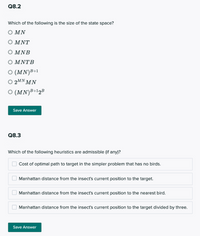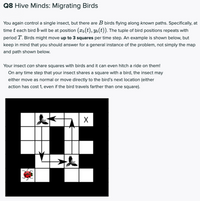
Computer Networking: A Top-Down Approach (7th Edition)
7th Edition
ISBN: 9780133594140
Author: James Kurose, Keith Ross
Publisher: PEARSON
expand_more
expand_more
format_list_bulleted
Question

Transcribed Image Text:Q8.2
Which of the following is the size of the state space?
Ο ΜΝ
Ο ΜΝΤ
Ο ΜΝΒ
Ο ΜΝΤB
O (MN)B+1
O 2MN M N
O (MN)³+12B
Save Answer
Q8.3
Which of the following heuristics are admissible (if any)?
O Cost of optimal path to target in the simpler problem that has no birds.
Manhattan distance from the insect's current position to the target.
O Manhattan distance from the insect's current position to the nearest bird.
Manhattan distance from the insect's current position to the target divided by three.
Save Answer

Transcribed Image Text:Q8 Hive Minds: Migrating Birds
You again control a single insect, but there are B birds flying along known paths. Specifically, at
time t each bird b will be at position (x¿(t), Yb(t)). The tuple of bird positions repeats with
period T. Birds might move up to 3 squares per time step. An example is shown below, but
keep in mind that you should answer for a general instance of the problem, not simply the map
and path shown below.
Your insect can share squares with birds and it can even hitch a ride on them!
On any time step that your insect shares a square with a bird, the insect may
either move as normal or move directly to the bird's next location (either
action has cost 1, even if the bird travels farther than one square).
Expert Solution
This question has been solved!
Explore an expertly crafted, step-by-step solution for a thorough understanding of key concepts.
This is a popular solution
Trending nowThis is a popular solution!
Step by stepSolved in 2 steps

Knowledge Booster
Similar questions
- 3. A thief robbing a store finds n items. The i" item is worth v; dollars and weighs w; pounds, where v; and wi are integers. The thief wants to take as valuable a load as possible, but he can carry at most W pounds in his knapsack, for some integer W. Which items should he take? This problem is called 0-1 knapsack problem because for each item, the thief either take it or leave behind. No fractional amount from an item can be taken. Consider the most valuable load that weighs at most W pounds. If we remove item j from this load, the remaining load must be the most valuable load weighing at most W-w; that the thief can take from the n - I original items excluding j. Write a simple pseudo code for the given greedy algorithm description first and show how using this greedy algorithm to solve the problem of Knapsack problem below. Assume that maximum weight that can be carried is 7 lbs. Does it your code find the optimal solution? Show the optimal solution if it exists. Item Value ($)…arrow_forwardYou solve a non-singular system of 10,000 linear equations with 10,000 unknowns using the Gauss-Jordan algorithm without pivoting with single precision numbers and arithmetics on a computer that natively can do single precision operations very fast, but can operate in double and half precision as well. Your solution has a residual infinity-norm that is unacceptably large. In which order should you apply the following strategies to lower the residual norm? If a strategy is not / no longer helpful, do not list it as an option. a) use half precision numbers and arithmetics instead of single precision; b) use double precision numbers and arithmetics instead of single precision; c) use partial pivoting; d) use pivoting when encountering a zero in the pivot position.arrow_forwardI need the algorithm, proof of correctness and runtime analysis for the problem. No code necessary ONLY algorithm. And runtime should be O(n log n) as stated in the question.arrow_forward
- I need the answer as soon as possible Q4/ The ideal gas equation of states is given by: PV = nRT Where: P is the pressure, V is the volume, T is the temperature, R=0.08206 (L atm)/(mol K) is the ideal gas constant, and n is the number of moles. Real gases, especially at high pressures, deviate from this behavior. Their responses can be modeled with the van der Waals equation: nRT using matlab P- V-nb n² a v² 0 Where a and b are gas constants. For Cl₂ a = 6.579 L'atm/mol², and b = 0.0562 L/mol. (a) Write a code which asks the user to insert n, T, a, b and then plots P versus V on one figure - two plots for both equations if the volume range is (0.5arrow_forwardno handwritten Alice and Bob are playing a match to see who is the first to win n games, for some fixed n > 0. Suppose Alice and Bob are equally competent, that is, each of them wins a game with probability 1/2. Further, suppose that they have already played i + j games, of which Alice won i and Bob won j. Give an efficient algorithm to compute the probability that Alice will go on to win the match. For example, if i = n − 1 and j = n − 3, then the probability that Alice will win the match is 7/8, since she must win any of the next three games.arrow_forward
arrow_back_ios
arrow_forward_ios
Recommended textbooks for you
 Computer Networking: A Top-Down Approach (7th Edi...Computer EngineeringISBN:9780133594140Author:James Kurose, Keith RossPublisher:PEARSON
Computer Networking: A Top-Down Approach (7th Edi...Computer EngineeringISBN:9780133594140Author:James Kurose, Keith RossPublisher:PEARSON Computer Organization and Design MIPS Edition, Fi...Computer EngineeringISBN:9780124077263Author:David A. Patterson, John L. HennessyPublisher:Elsevier Science
Computer Organization and Design MIPS Edition, Fi...Computer EngineeringISBN:9780124077263Author:David A. Patterson, John L. HennessyPublisher:Elsevier Science Network+ Guide to Networks (MindTap Course List)Computer EngineeringISBN:9781337569330Author:Jill West, Tamara Dean, Jean AndrewsPublisher:Cengage Learning
Network+ Guide to Networks (MindTap Course List)Computer EngineeringISBN:9781337569330Author:Jill West, Tamara Dean, Jean AndrewsPublisher:Cengage Learning Concepts of Database ManagementComputer EngineeringISBN:9781337093422Author:Joy L. Starks, Philip J. Pratt, Mary Z. LastPublisher:Cengage Learning
Concepts of Database ManagementComputer EngineeringISBN:9781337093422Author:Joy L. Starks, Philip J. Pratt, Mary Z. LastPublisher:Cengage Learning Prelude to ProgrammingComputer EngineeringISBN:9780133750423Author:VENIT, StewartPublisher:Pearson Education
Prelude to ProgrammingComputer EngineeringISBN:9780133750423Author:VENIT, StewartPublisher:Pearson Education Sc Business Data Communications and Networking, T...Computer EngineeringISBN:9781119368830Author:FITZGERALDPublisher:WILEY
Sc Business Data Communications and Networking, T...Computer EngineeringISBN:9781119368830Author:FITZGERALDPublisher:WILEY

Computer Networking: A Top-Down Approach (7th Edi...
Computer Engineering
ISBN:9780133594140
Author:James Kurose, Keith Ross
Publisher:PEARSON

Computer Organization and Design MIPS Edition, Fi...
Computer Engineering
ISBN:9780124077263
Author:David A. Patterson, John L. Hennessy
Publisher:Elsevier Science

Network+ Guide to Networks (MindTap Course List)
Computer Engineering
ISBN:9781337569330
Author:Jill West, Tamara Dean, Jean Andrews
Publisher:Cengage Learning

Concepts of Database Management
Computer Engineering
ISBN:9781337093422
Author:Joy L. Starks, Philip J. Pratt, Mary Z. Last
Publisher:Cengage Learning

Prelude to Programming
Computer Engineering
ISBN:9780133750423
Author:VENIT, Stewart
Publisher:Pearson Education

Sc Business Data Communications and Networking, T...
Computer Engineering
ISBN:9781119368830
Author:FITZGERALD
Publisher:WILEY